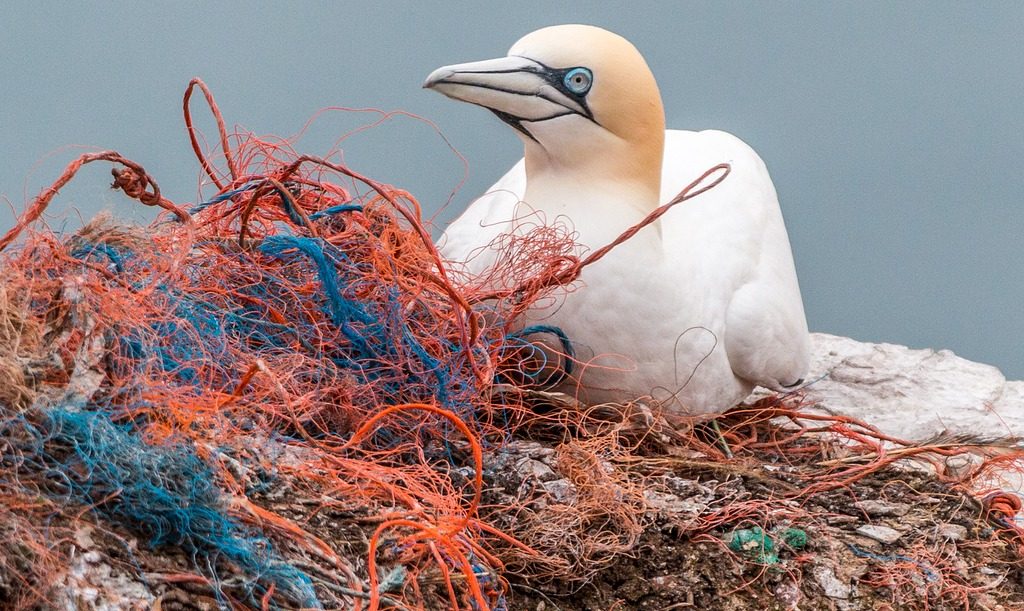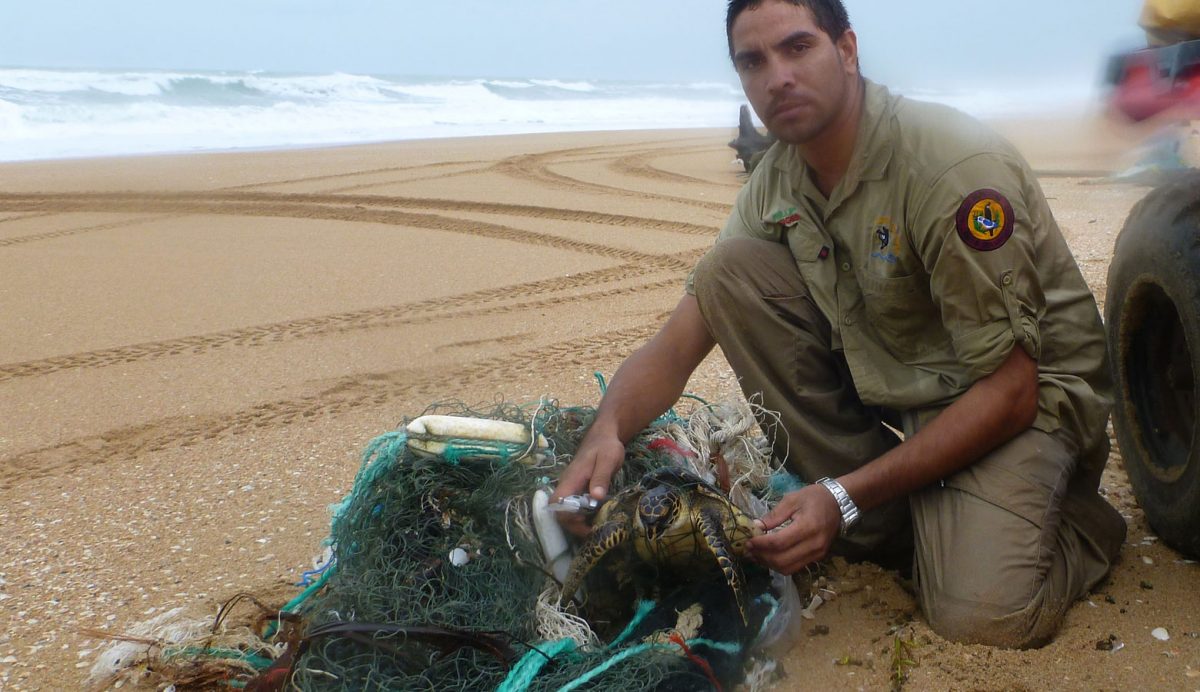
We predict by 2050, 95 per cent of seabirds will have eaten plastic.
It’s estimated our oceans contain upwards of 150 million metric tonnes of plastic. That’s 150,000,000,000 kilograms. If we converted all those kilograms into litres of water, we could fill the MCG to the brim more than 95 times. It’s actually even worse than that because plastics are usually lighter than water so they’d take up even more space than we can calculate. That’s not even all the rubbish in our oceans – we’re JUST talking plastic.
It’s not cool to be single
Single-use plastics are becoming a hot topic in the media, and we couldn’t be happier. For many years our marine research team have been fastidiously studying the effects of marine debris, especially plastics, on our oceans and wildlife.

Turtles don’t only get caught up in debris, they’re also accidentally eating it. In one of our recent studies, 33 turtles had collectively eaten a terrifying 1057 pieces of debris!
In 2014 our researchers found that almost half (43 per cent) of seabirds have plastic in their gut, with young birds being particularly susceptible. If plastic production continues to increase globally and no effort is made to curb the amount that finds its way into the oceans, we predict by 2050 nearly every seabird (95 per cent) will have eaten some plastic. Consumed plastic often accumulates in the digestive tracts of animals, increasingly affecting their capacity to feed, their health and may even cause death. It’s not just eating plastic that causes problems: many animals are maimed or killed by abandoned fishing nets, which isn’t surprising when you consider six million tonnes of fishing gear is lost in oceans every year.
The numbers add up
If the idea of a small baby bird dying doesn’t incentivise you to change, perhaps the financial impact will. Pollution in the oceans has high economic costs that affect many different sectors; including human health, fisheries, transport and tourism. It is estimated that marine debris costs approximately US$13 billion each year – and without significant change, that figure is expected to increase.
How can you help?
Every little bit of plastic rubbish is in someone’s hands before it travels across the land and reaches the ocean. If we stop rubbish from entering the ocean, we will be a massive step closer to resolving this problem. So what can you do about it? Here are five easy suggestions:
- People power: Got a favourite product that is covered in plastic? Send an email to the company advocating for change! It’s not unheard of for companies to review and improve their packaging process after receiving a few polite emails or social media comments from their loyal customers.
- Feeling fishy: As many as 15,000 turtles are caught in dumped or lost fishing gear in Northern Australia each year. So after landing your big catch, take your fishing lines, nets, lures, hooks and sinkers home with you.
- Plastic-free party: Balloons, curling ribbon and party poppers all make for a festive party, but our studies have shown even rubbish from an inner-city party will make its way to the ocean. Instead of streamers, you can buy some fabric bunting and use reusable cups, cutlery and plates.
- Bottle besties: Instead of buying single-use water bottles, take a beautiful re-usable bottle with you wherever you go. Not only are you helping the environment, you’ll probably drink more water if a bottle is right there waiting for you. Hello, hydrated skin.
- Bag brag: In water, plastic bags look uncannily like jellyfish – a staple food for turtles. If you’re not known for your organisational skills and regularly drive to the supermarket, keep a few reusable bags in your car so you have them ready to go when you need them.
While you’re busy helping make a difference locally, our researchers are busy working on the world’s largest marine pollution project: helping industries and governments around the world to implement large-scale solutions.


4th August 2018 at 10:51 pm
From your own comments policy “Please keep in mind that CSIRO is dedicated to providing impartial scientific information” This is a particularly poor piece of writing and suggesting an equally poor approach to participating in solving a problem. It is neither impartial or scientific, or accurate. Having vaguely identified the problem, irrelevant solutions are offered. Statements that should have links do not and where links are provided, the information is not pertinent to the comment. Switching between ingestion and entanglement and back again also shows poor understanding. BTW the figure is 640,000 tonnes of derelict fishing gear worldwide according to World Economic Forum. Bad enough, but not six million tonnes. But trying to suggest that taking your fishing gear home is going to contribute to saving turtles in northern Australian waters or anywhere else is ludicrous. And simply not using plastic at a party is equally as non-sensical when the message should be ensuring the area is left clean and items are disposed of or reused appropriately. This sort of writing may elicit an emotional response but it is not factual or fair. Agree with comment above re expected standards
1st August 2018 at 6:05 pm
It was delightful to see that some organisations are trying to turn plastic back into oil. If we could mine plastic with all the enthusiasm of oil and gas mining, then we might be onto something to help reduce the amount of plastic in the environment. Also it would be great if all the shops would take back their own packaging and “dead” products. Some are doing it, which is good. Maybe a tax on certain types of packaging might help too.
31st July 2018 at 2:15 am
Hello Eliza,
By being over cautious on your rules to comments, you have deprived your readers of a good solution to clean macroplastics from streams and channels preventing them from reaching the ocean. A quick review of the link provided would have proved that is harmless and very useful to the subject under discussion.
28th July 2018 at 2:25 pm
Macro plastics ( the ones we can see ) are a major problem in our oceans and the ones that float can be removed . Unfortunately much of this has already sunk to the sea floor . All the macro plastics break down eventually into micro and nano particulates which makes it an even bigger problem since it is impossible to remove from the oceans . Other sources of micro and nano particulates of plastic come from the wearing away of tyres , footwear , synthetic clothing and paint to name a few . A large percentage of this enters the oceans every time it rains . These particulates are being consumed by all marine creatures and accumulates up through the food chain . There’s not a creature in the oceans that hasn’t consumed some of these particulates of plastic . A ban on single use plastics would go some way towards fixing the problem , there is alternatives , they might cost a bit more but , hey , we have to get on top of this devastating problem . Synthetic clothing can be replaced with natural fibre products , wool , cotton , hemp and bamboo for example . As for tyres , footwear and paint I don’t know what the alternatives are but we have to find some before our oceans are completely contaminated . We can stop the macro plastics from entering the oceans but it’s almost impossible to stop micro and nano particulates unless we change our ways big time .
27th July 2018 at 11:45 pm
In a developed country like Australia, the suggestions listed above are really not very effective. As this article states – https://cosmosmagazine.com/biology/just-10-rivers-to-blame-for-millions-of-tonnes-of-ocean-plastic – the real problem is in the developing countries and we, the rich technologically advanced nations, should be putting our money, research and inventiveness into helping them reduce their plastic pollution.
30th July 2018 at 10:00 am
Hi Bernie,
We are not suggesting the quick tips we provided will resolve this global issue. Instead, we were trying to provide specific things that individuals can do in their daily lives (thankfully, they’re not mutually exclusive). We’re currently undertaking an international project working in key countries to document leakage into the environment. Check out our website for further details https://research.csiro.au/marinedebris/projects/oak-foundation/
Cheers,
Eliza